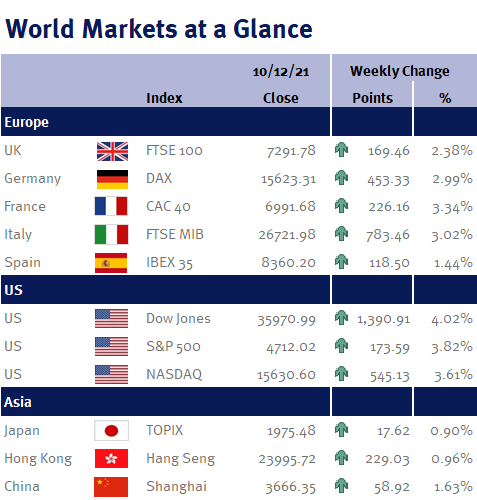Whilst equity market sentiment was bolstered this week, volatility will remain elevated in the near term, as we learn more about the new variant and financial markets react to news headlines. However, long term investors should avoid any knee-jerk reactions, as time in the market is much more important than trying to time the market. It was twelve months ago this week, that the first Covid vaccine from a mass vaccination program was administered, and while the virus remains prevalent and impacting everyday lives, many equity market returns have been spectacular over that period.
In addition to early positive Omnicom indications, Chinese monetary policy commitments helped boost investor optimism this week. China has recently been implementing policies with the aim of achieving ‘common prosperity’. This has created volatility in certain sectors, the most notable of which has been the property sector. At its annual Central Economic Work Conference, China indicated a much more balanced approach to short-term and long-term goals and made several commitments to stabilise macroeconomic conditions and ensure the economy grows within a reasonable range next year. This helped temper concerns ahead of next years all important 20th National Party Congress.
In the UK, October’s economic data fell short of expectations, monthly GDP was +0.1%, industrial production was up 1.4% from the prior year, whilst manufacturing was flat. Energy prices, staff shortages and supply chain problems were cited as the biggest detractors. Encouragingly though, the forward-looking UK construction PMI survey for November came in above expectations and indicated these pressures could be easing, as firms reported fewer supplier delays, and an easing of input cost inflation.
Finally, November’s US CPI inflation reading of 6.8% over the year, was the highest reading since 1982, albeit in line with expectations. This reading reinforces expectations the US Fed will accelerate tapering its bond buying program next week. However, if supply chain bottlenecks continue to ease, whilst inflation will likely remain elevated, many believe this reading could be the peak. Accordingly, US President Joe Biden said this week he expects US inflation will decelerate much more rapidly than currently anticipated.
In addition to the US, next week the European Central Bank, Bank of Japan and Bank of England will all be setting monetary policy and with the developments of the past few weeks, any previous expectations are anything but certain. There is also a plethora of data releases next week, key among them are; US PPI, housing starts, initial jobless claims and industrial production, UK unemployment and inflation data and Chinese retail sales, industrial production and home prices.
Peter Quayle, Fund Manager


